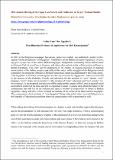Files in this item
Letter from ‘one Egyptian’ : first historical evidence of aspirations for civil emancipation
Item metadata
| dc.contributor.author | Marushiakova-Popova, Elena Andreevna | |
| dc.contributor.author | Popov, Veselin | |
| dc.date.accessioned | 2016-12-14T16:30:23Z | |
| dc.date.available | 2016-12-14T16:30:23Z | |
| dc.date.issued | 2016-11-26 | |
| dc.identifier | 247985467 | |
| dc.identifier | 00fdd6d5-2f7a-4d32-a3a8-82b99622d3ed | |
| dc.identifier.citation | Marushiakova-Popova , E A & Popov , V 2016 , Letter from ‘one Egyptian’ : first historical evidence of aspirations for civil emancipation . in The Gypsy Lore Society web page . Gypsy Lore Society . | en |
| dc.identifier.other | ORCID: /0000-0001-5333-2330/work/40320184 | |
| dc.identifier.other | ORCID: /0000-0002-6565-8730/work/40320590 | |
| dc.identifier.uri | https://hdl.handle.net/10023/9974 | |
| dc.description | This presentation is part of the research project “RomaInterbellum. Roma Civic Emancipation between the Two World Wars” that has received funding from the European Research Council (ERC) under the European Union’s Horizon 2020 research and innovation programme (grant agreement No 694656). | en |
| dc.description.abstract | In 1867 in the Bulgarian newspaper “Macedonia”, printed in Istanbul, was published a reader's letter, signed with the pseudonym “one Egyptian”. At that time, on the Balkans the name "Egyptians" (Γυφτοι, Egyuptsi, Gyupti, etc. in the various Balkan languages) designated a community whose official name in Ottoman-Turkish was Kıptı or Çingene, and whose descendants today self-determine as Roma or Balkan Egyptians. This letter can be understood in the context of ongoing processes of national emancipation of the Balkan peoples, especially in the context of the struggles of the Bulgarian church community for exiting the Orthodox Christian Patriarchate, which was dominated by the Greek clergy. “One Egyptian” in his letter protests against the stereotypes about the “Egyptians”, which are reflected in the practice of the Orthodox Church, and advocates for the creation of “own” church, “own” language, “own” clergy and in perspective the creation of “own” education and “own society” (i.e. own country). In the proposed presentation will be analyzed the content of this Letter in general social and political context of the time and will be explained its main visionary ideas about the future of the communities that still live in the Balkans and identify themselves respectively as Roma or Balkan Egyptians. Along with this will be revealed the identity of the writer of the letter and his biography. The communities which are heirs of “one Egyptian” living today in his native town of Prilep (now in the Republic of Macedonia) and their historical consciousness will be presented as well. | |
| dc.format.extent | 176083 | |
| dc.language.iso | eng | |
| dc.publisher | Gypsy Lore Society | |
| dc.relation.ispartof | The Gypsy Lore Society web page | en |
| dc.title | Letter from ‘one Egyptian’ : first historical evidence of aspirations for civil emancipation | en |
| dc.type | Conference item | en |
| dc.contributor.sponsor | European Research Council | en |
| dc.contributor.sponsor | European Research Council | en |
| dc.contributor.institution | University of St Andrews. School of History | en |
| dc.identifier.url | https://sites.google.com/site/glsproceedings/2016-proceedings | en |
| dc.identifier.grantnumber | 694656 | en |
| dc.identifier.grantnumber | 694656 | en |
This item appears in the following Collection(s)
Items in the St Andrews Research Repository are protected by copyright, with all rights reserved, unless otherwise indicated.

